The Rhenish firm “Leuconide Metalware Factory and trading Company J.P Kayser and Son in Krefeld- Bockum was known for its progressive style and was the leading factory of making pewter in the period 1894-1912.
The firm’s workshop was situated in Krefeld-Bochum and was under the direction of Jean Kayser. The design studio was set up in Cologne in 1894 by Engelbert Kayser (1840-1911).
He was the “father of Kayserzinn”.
Among the artist employed full-time in the design studio were:
Hugo Leven(1874-1956),
Karl Geyer (1858-1912)
Hermann Fauser(1874-1947)
Karl Berghof(1881-1967).
Hans Stoltenberg-Lerche (1867-1920)
Another outside designer was Professor Johann Cristian Kroner(1838-1911) a Dusseldorf painter of hunting-scenes
The hunting motifs in relief are found on several dishes that were so popular at that time. They were based on his designs. Also a French artist Jean Garnier was the designer of several items.The Kayserzinn firm received generous recognition at home and abroad in a short space of time
They received a Gold medal at the Paris World Exhibition in 1900, another Gold medal at the First Exhibition of Modern Art in Turin 1902 and carried off a similar prize at the
German-National-trade Exhibition in Düsseldorf.
Finally they received a Gold medal at the ST.Louis Universal Exhibition in 1904(U.S.A)
J.P Kayser and Son had around 400 workers in 1898. In 1900, 500 founders alone were working for the firm. At the time of the Paris Exhibition the work-force reached 800 workers
After 1904 there was an economic decline ,and after 1906 the staff of the Cologne design-studio was reduced and also the pewter production.
The price of pewter was extremely unsteady.The artistic significance of Kayserzinn died with the death of Engelbert Kayser in1911.
Kayserzinn object are numbered from the (fictitious) number “4000” onwards and with the word”Kayserzinn”
All objects are marked this way ,either in a circular or oval frame,or horizontally.
The number ,4000 , was introduced in 1894/5 the last number 4999 was produced in 1925.
StatCounter - Free Web Tracker and Counter
Items in our collection
kayserzinn bonbon dish
date : 1902/1904
designer : Herman Fauser
marked : kayserzinn 4471 in a oval and a 52 stamped
length :5.5 inch /14.5 cm
width : 3.6 inch / 9.0 cm
height : 4.5 inch /11 cm
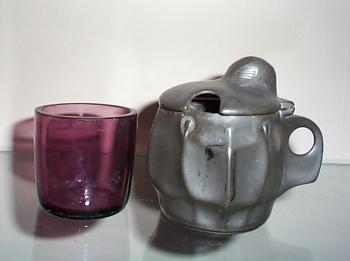
kayserzinn mustard pot with liner
date :1902 / 1904
designer : Hugo Leven
marked : kayserzinn 4473 in a circular and a 18 stamped
note : with the original purple glass liner
height : 3.0 inch / 7.5 cm
width ( with ear ) : 3.3 inch / 8.0 cm
kayserzinn knife rest “hare”
date : 1902 /1904
designer : unknown
marked : kayserzinn stamped no number but is nr 4488
length : 4.0 inch / 10 cm
kayserzinn knife rest “dog”
date : 1902 /1904
designer : unknown
marked : kayserzinn stamped no number but is nr 4490
length : 3.5 inch / 9.0 cm
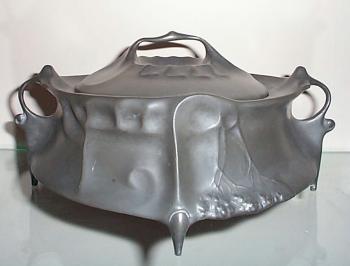
kayserzinn biscuit jar
date : 1902 /1904
designer : Hugo Leven
marked : kayserzinn 4504 in a circular and a 27 stamped
length : 8.3 inch / 21 cm
width : 7.5 inch /19 cm
height : 4.5 inch /11 cm
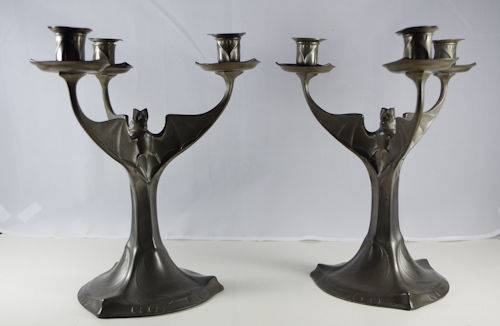
kayserzinn pair of candelabra's
date : 1902 /1904
designer : Hugo Leven
marked : kayserzinn 4506 in an oval
height : 11.5 inch / 31.0 cm
kayserzinn bottle stand
date : 1902 /1904
designer : Hugo Leven
marked : kayserzinn 4512 in a circular
Ø : 4.8 inch /12 cm
height : 2.5 inch /6.0 cm
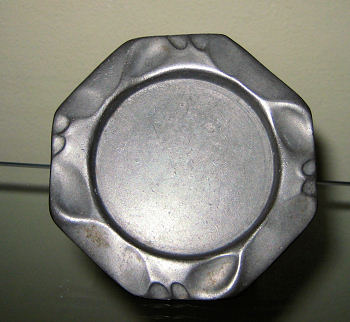
kayserzinn coaster
date 1902 / 1904
designer : Hugo Leven
marked ; kayserzinn 4537 a circle
Ø : 2.6 inch / 7.0 cm
kayserzinn knife rests “cat”
date : 1904 /1906
designer : unknown
marked : kayserzinn no number but is nr 4574
length : 4.8 inch / 12 cm
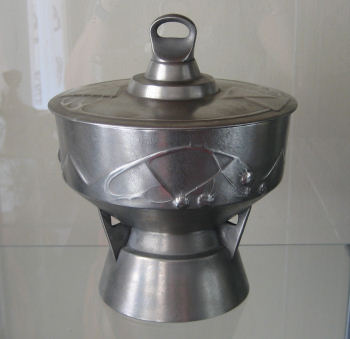
kayserzinn biscuit jar
date : 1904 /1906
designer : Karl Berghof
marked : kayserzinn 4575 in a circle
width : 5.6 inch / 14.0 cm
height : 7.0 inch / 17.5 cm
- ‹ Previous
- 2 of 3
- Next ›
